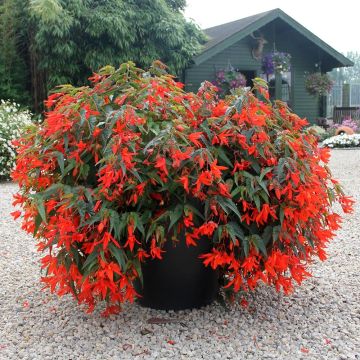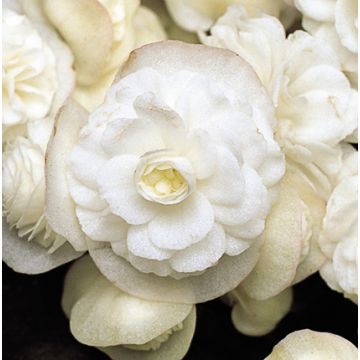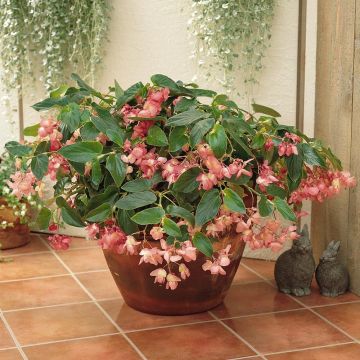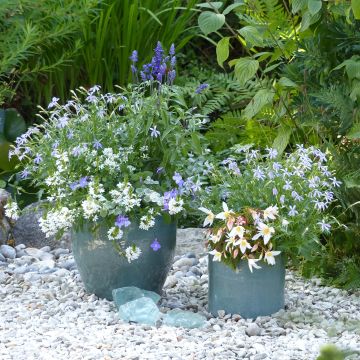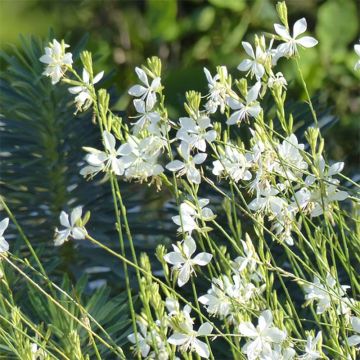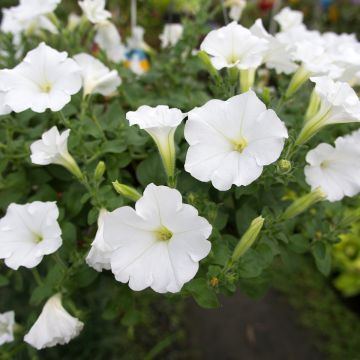

Begonia Sunbrero Dark Pink
Begonia Sunbrero Dark Pink
Begonia x semperflorens Sunbrero Dark Pink
Wax Begonia, Fibrous Begonia, Bedding Begonia
This item cannot be shipped to the selected country
Delivery charge from €5.90
More information
Schedule delivery date,
and select date in basket
This plant carries a 6 months recovery warranty
More information
We guarantee the quality of our plants for a full growing cycle, and will replace at our expense any plant that fails to recover under normal climatic and planting conditions.
From €5.90 for pickup delivery and €6.90 for home delivery
Express home delivery from €8.90.
Does this plant fit my garden?
Set up your Plantfit profile →
Description
The Begonia 'Sunbrero Dark Pink' is part of a series of very floriferous begonias, sun-tolerant and with a well-rounded habit. It bears lovely double flowers that resemble roses in their shape and intense pink colour. They continue to bloom until the first frosts, on a densely branched plant that does not exceed 25 cm (10in) in all directions. Its corollas, large compared to the size of the plant, open on a round and shiny dark green foliage. Begonia 'Sunbrero' can be planted from April, in partial shade or even in full sun, in borders or pots. It requires little maintenance.
The Begonia 'Sunbrero Dark Pink' is a non-hardy herbaceous perennial plant (it perishes below -4°C (24.8°F)), grown as an annual, belonging to the begonia family. It is derived from the Begonia semperflorens, a hybrid between two species native to Brazil. 'Sunbrero' has stout, fleshy stems, covered with leathery, rounded leaves of a beautiful dark green colour, shiny, about 5 cm (2in) long. This branched plant with an upright habit quickly reaches 25 cm (10in) in all directions. Appearing from June and present until the first frosts, its flowers are composed of multiple rounded petals, arranged around a tight little heart. Begonias are monoecious and bear exclusively male attributes (single flowers) and other female attributes (double flowers). They are grouped in numerous terminal clusters.
The Begonia 'Sunbrero Dark Pink' is used in borders, in planters, balcony boxes or in large flower pots. The begonias of this Sunbrero series form beautiful borders, with a mix of varieties, in both full sun and partial shade. For a border planting, plan about 10 plants per square meter. They combine well with light foliage and flower plants, such as lobelias, annual pennisetums, bacopas, bidens, but also with petunias. In a more exotic spirit, a colourful scene can be created by associating the border begonia with cannas or hedychiums. Finally, it is good to know that there are hardy begonias, such as Begonia grandis.
Note: Attention, our young plug plants are professional products reserved for experienced gardeners: upon receipt, transplant and store them in a sheltered place (veranda, greenhouse, cold frame) at a temperature above 14°C (57.2°F) for a few weeks before being installed outdoors once the risk of frost is definitively removed.
Report an error about the product description
Begonia Sunbrero Dark Pink in pictures


Flowering
Foliage
Plant habit
Botanical data
Begonia
x semperflorens
Sunbrero Dark Pink
Bégoniaceae
Wax Begonia, Fibrous Begonia, Bedding Begonia
Cultivar or hybrid
Other Begonia
Planting and care
The 'Sunbrero Dark Pink' Begonia should be planted in a well-drained, fertile, humus-rich and light soil, moist but not waterlogged, in full sun or partial shade. Excess moisture makes it susceptible to diseases. Water moderately (it cannot tolerate excess water!) and provide frequent fertilization for intense flowering. During the growing season, it is beneficial to apply flowering plant fertilizer every week. Beware of snails and slugs that love to devour young plants. The Semperflorens Begonia can be susceptible to powdery mildew and botrytis. Begonias are sensitive to frost, so they cannot tolerate freezing temperatures. For this reason, they are often grown in containers that can be easily brought indoors into greenhouses or heated conservatories at the first signs of frost.
Planting period
Intended location
Care
-
, onOrder confirmed
Reply from on Promesse de fleurs
Plug plants - Annuals
Haven't found what you were looking for?
Hardiness is the lowest winter temperature a plant can endure without suffering serious damage or even dying. However, hardiness is affected by location (a sheltered area, such as a patio), protection (winter cover) and soil type (hardiness is improved by well-drained soil).

Photo Sharing Terms & Conditions
In order to encourage gardeners to interact and share their experiences, Promesse de fleurs offers various media enabling content to be uploaded onto its Site - in particular via the ‘Photo sharing’ module.
The User agrees to refrain from:
- Posting any content that is illegal, prejudicial, insulting, racist, inciteful to hatred, revisionist, contrary to public decency, that infringes on privacy or on the privacy rights of third parties, in particular the publicity rights of persons and goods, intellectual property rights, or the right to privacy.
- Submitting content on behalf of a third party;
- Impersonate the identity of a third party and/or publish any personal information about a third party;
In general, the User undertakes to refrain from any unethical behaviour.
All Content (in particular text, comments, files, images, photos, videos, creative works, etc.), which may be subject to property or intellectual property rights, image or other private rights, shall remain the property of the User, subject to the limited rights granted by the terms of the licence granted by Promesse de fleurs as stated below. Users are at liberty to publish or not to publish such Content on the Site, notably via the ‘Photo Sharing’ facility, and accept that this Content shall be made public and freely accessible, notably on the Internet.
Users further acknowledge, undertake to have ,and guarantee that they hold all necessary rights and permissions to publish such material on the Site, in particular with regard to the legislation in force pertaining to any privacy, property, intellectual property, image, or contractual rights, or rights of any other nature. By publishing such Content on the Site, Users acknowledge accepting full liability as publishers of the Content within the meaning of the law, and grant Promesse de fleurs, free of charge, an inclusive, worldwide licence for the said Content for the entire duration of its publication, including all reproduction, representation, up/downloading, displaying, performing, transmission, and storage rights.
Users also grant permission for their name to be linked to the Content and accept that this link may not always be made available.
By engaging in posting material, Users consent to their Content becoming automatically accessible on the Internet, in particular on other sites and/or blogs and/or web pages of the Promesse de fleurs site, including in particular social pages and the Promesse de fleurs catalogue.
Users may secure the removal of entrusted content free of charge by issuing a simple request via our contact form.
The flowering period indicated on our website applies to countries and regions located in USDA zone 8 (France, the United Kingdom, Ireland, the Netherlands, etc.)
It will vary according to where you live:
- In zones 9 to 10 (Italy, Spain, Greece, etc.), flowering will occur about 2 to 4 weeks earlier.
- In zones 6 to 7 (Germany, Poland, Slovenia, and lower mountainous regions), flowering will be delayed by 2 to 3 weeks.
- In zone 5 (Central Europe, Scandinavia), blooming will be delayed by 3 to 5 weeks.
In temperate climates, pruning of spring-flowering shrubs (forsythia, spireas, etc.) should be done just after flowering.
Pruning of summer-flowering shrubs (Indian Lilac, Perovskia, etc.) can be done in winter or spring.
In cold regions as well as with frost-sensitive plants, avoid pruning too early when severe frosts may still occur.
The planting period indicated on our website applies to countries and regions located in USDA zone 8 (France, United Kingdom, Ireland, Netherlands).
It will vary according to where you live:
- In Mediterranean zones (Marseille, Madrid, Milan, etc.), autumn and winter are the best planting periods.
- In continental zones (Strasbourg, Munich, Vienna, etc.), delay planting by 2 to 3 weeks in spring and bring it forward by 2 to 4 weeks in autumn.
- In mountainous regions (the Alps, Pyrenees, Carpathians, etc.), it is best to plant in late spring (May-June) or late summer (August-September).
The harvesting period indicated on our website applies to countries and regions in USDA zone 8 (France, England, Ireland, the Netherlands).
In colder areas (Scandinavia, Poland, Austria...) fruit and vegetable harvests are likely to be delayed by 3-4 weeks.
In warmer areas (Italy, Spain, Greece, etc.), harvesting will probably take place earlier, depending on weather conditions.
The sowing periods indicated on our website apply to countries and regions within USDA Zone 8 (France, UK, Ireland, Netherlands).
In colder areas (Scandinavia, Poland, Austria...), delay any outdoor sowing by 3-4 weeks, or sow under glass.
In warmer climes (Italy, Spain, Greece, etc.), bring outdoor sowing forward by a few weeks.




































